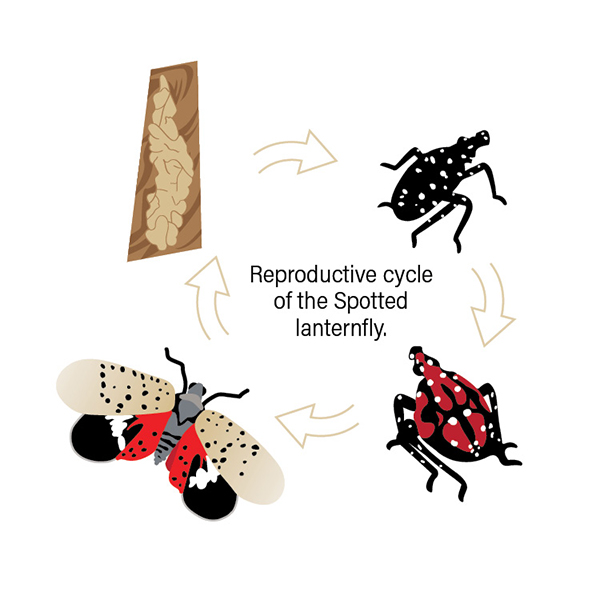Spotted lanternfly now in northern Indiana
Spotted this July in Huntington County, the invasive spotted lanternfly has officially migrated to northern Indiana, just one year after its initial spotting in Switzerland County.
Cliff Sadof, professor of entomology and Purdue Extension fellow, said this migration poses a significant agricultural risk to wine grape growers, honeybee producers and walnut tree producers. While the spotted lanternfly feeds on over 100 different types of plants, Sadof said the insect can only reproduce when feeding on walnut trees, grape vines or tree of heaven.
Elizabeth Long, assistant professor of horticulture crop entomology, said one of the best defenses against the spotted lanternfly wine grape growers can currently take is learning to identify the life stages of the insect and remain vigilant for them on grape vines and tree of heaven.

“Several of the insecticides grape growers currently use for other insect pests will also knock down the spotted lanternfly, so there is no need to make additional sprays as a preventative at this time,” Long said. “Looking to next season, the same strategy is needed. Keeping an eye out for spotted lanternfly hitchhikers and avoiding moving items that are likely to accidentally move insects along are key. Spotted lanternfly populations feeding on wine grape vines can severely reduce winter hardiness or kill the crop all together.”
Brock Harpur, assistant professor of entomology, said beekeeping equipment can provide the perfect spot for spotted lanternflies to lay eggs, allowing the insect to travel around the state.
“It is imperative for beekeepers to keep a careful eye out for signs of the spotted lanternfly in their area and on their equipment,” Harpur said. “Should the spotted lanternfly become established in all parts of Indiana, it is expected that honeydew, the secretion that spotted lanternfly leave behind, will become part of our late-summer honey harvest.”
Bees make good use of any honeydew they collect, Harpur said, but that isn’t desirable. If a colony does collect honeydew, a beekeeper may notice the honey has a smokey taste and smell and is less sweet than a typical honey. The honeydew tainted product has a darker brown color and a notable aftertaste.
Though the full-grown adults have beautiful coloring and patterns, spotted lanternfly eggs resemble a splash of mud, making them easy to overlook on large vehicles traveling from state to state. Homeowners should also remain vigilant in keeping populations in check, Sadof said, as the honeydew secretions from the insect are frequently spread across homes and structures and are extremely difficult to remove when dried.
The Indiana Department of Natural Resources asks all residents to search for and report spotted lanternfly sightings. Anyone who spots the insect should take a photo if possible, Sadof said, and send the image and location to DEPP@dnr.in.gov, or call 1-866-No-Exotic.
Banner image courtesy of Indiana Department of Natural Resources.






